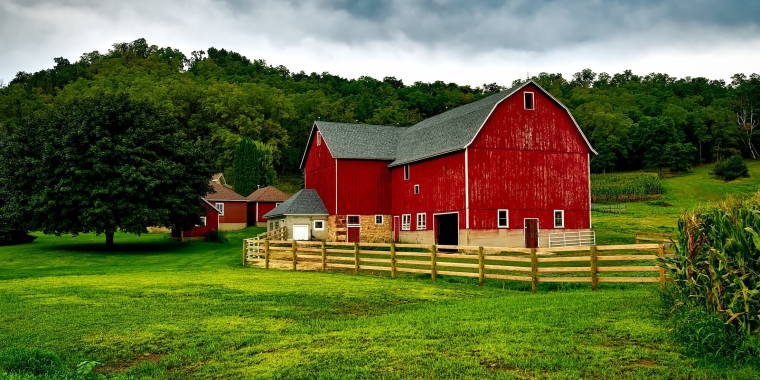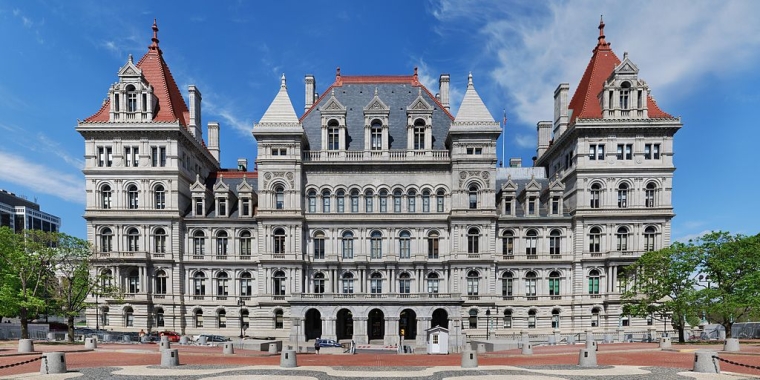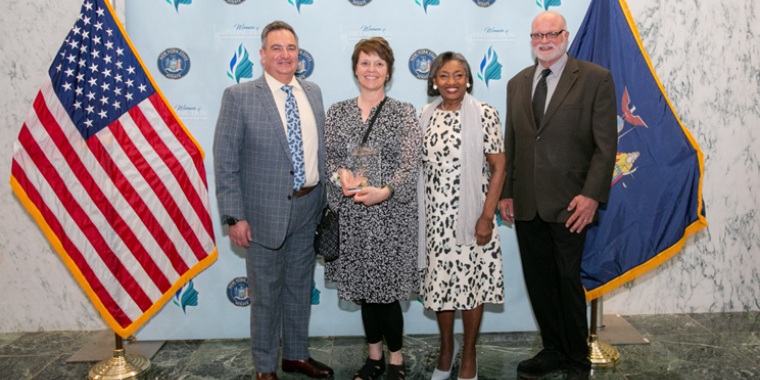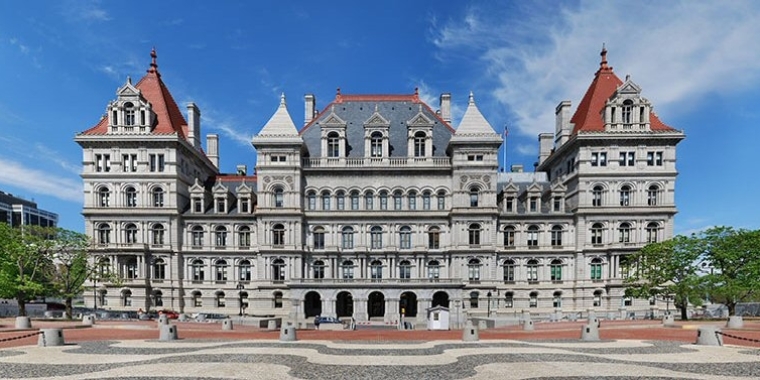
Senate Republican Leader Rob Ortt, Senator George Borrello and Colleagues Lead Push to Delay Decision on Changing 60-Hour Overtime Threshold for Farm Workers
August 31, 2020

ALBANY, NY – As the Farm Laborers Wage Board holds hearings on the 60-hour overtime threshold for farmworkers, Senate Republican Leader Rob Ortt and Senator George Borrello joined colleagues and members of the farming community in calling for freezing the threshold at its current level to enable the collection of more data on the mandate’s impact. Senator Borrello, Ranking Member of the Senate Agriculture Committee, has introduced legislation, Senate Bill 8944, that would delay the board’s recommendation until 2024.
"When New York City Democrats forced this law on Upstate farmers, we said it would have a devastating impact and it must be fully repealed. Here we are just eight months into its implementation, during one of the worst seasons farmers have seen, and already a wage board is contemplating making even more harmful changes to hours employees can work. This decision, especially in light of COVID-19, must be delayed so that insight can be gained over a lengthy period of time as to how seasons and conditions change from year to year. To make a determination now would just harm our already suffering family farms and their hard workers," said Leader Ortt.
“Farms in New York State have not yet completed even a single growing season under the mandates of this burdensome new law, which took effect on January 1, 2020. They are still grappling with the changes and trying different strategies to comply with the 60-hour threshold while trying to keep their operations afloat. It is incomprehensible that they are already being confronted with the possibility that the threshold will be lowered even further,” said Senator Borrello.
“Additionally, the COVID-19 crisis created fresh financial hardships for farmers and unprecedented disruptions to the food supply chain. Not only would it be terribly unfair to add to their difficulties right now, this season has been anomaly, so it would be a mistake to base any long-term decisions on this year’s experiences. For these and so many reasons, we need to hit the pause button on this premature effort to evaluate a brand new law,” he added. “While repeal of the law is the ultimate goal, our effort right now is to prevent further damage and bring common sense to this issue by delaying any decision on the 60-hour threshold until 2024.”
Passed in 2019, the Farm Workers Fair Labor Practices Act granted year-round and seasonal farm employees many of the same labor rights and benefits as workers in other industries. Those rights included collective bargaining, housing protections, enhanced worker’s compensation protection and overtime pay of one and a half times an employee’s regular wages after 60 hours of work per week and/or if they choose to work on a designated day of rest.
The bill also mandated that the state Labor Commissioner establish a farmworkers’ wage board to examine the overtime pay threshold and consider whether it should be lowered even further. The current three-member board includes former New York State AFL-CIO President Denis Hughes, Buffalo Urban League President Brenda McDuffie and New York Farm Bureau President David Fisher.
Despite the insistence of struggling farmers across the state that the measure could put them out of business, and projections from farm industry associations showing that the measure could increase wage expenses by a crippling 44 percent, a coalition of activists and downstate lawmakers pushed the bill forward. The Governor signed the bill into law on July 17, 2019 in Manhattan.
“New York’s family farms produce top quality foods for customers across the nation and world. This is something we should all be proud of. However, this is a challenging time for farmers and their employees, which has only been made worse by the Farm Labor Act. The decisions of this unelected wage board will help determine whether or not many of these farms stay in business. It will impact the lives of those they employ who will be forced to seek opportunities in other states where they can work the hours they need to support their families. We have a duty and obligation to stand up for these farmers and their workers. The ink is barely dry on the original law and we haven’t even reached the end of the first growing season since it’s been in effect. Now is not the time for this board to make knee jerk decisions and it’s imperative that we hit the pause button until the full impact of the current law is understood. That’s just common sense. We need to include both farmers and their workers as equal partners in this discussion, not an afterthought,” said Senator Helming.
“New York’s hard-working family farmers have been working even harder during the COVID outbreak. We’ve counted on our family farmers to produce the nutritious, affordable, safe, and reliable food supply that fills our grocery stores and feeds our families. The reality is that the imposition of more state wage and labor mandates will hurt family farmers and likely drive many more out of business, permanently. It’s more important than ever that Albany listens to farmers, hears their concerns, and stops these wage and labor mandates from moving forward so we can protect our food supply, economy, and this cherished way of life. Now is the time to stand in bi-partisan support of our family farmers, the very same folks we’ve been able to count on throughout the COVID crisis to keep our shelves filled and tables full,” Senator Daphne Jordan said.
"In another stunning example of tone deafness the Cuomo administration is making it harder for our farmers, even as they struggle with a pandemic and already difficult business conditions" said Senator Rich Funke. "Last year's farm labor law dealt a serious blow to agriculture in our state and now, eight months later, the Governor is tightening the screws again. It's wrong and I urge the administration to reconsider. Agriculture is the backbone of an already struggling upstate economy. We can't afford to lose any more businesses or any more jobs."
Senator Tom O’Mara said, “I was opposed to this Act, and especially the creation of this unelected, unaccountable wage board, from the start. It is critical for upstate legislators, for whom the farm economy is a foundation of communities we represent, to keep close watch on a wage board now holding the future of so many farmers and agricultural communities in its hands. This is the worst possible time for the state to risk mandating and regulating more farms out of business, and that is exactly what’s at stake here. If this wage board drives more farmers out of business, Governor Cuomo and the Democrat legislative majorities will be responsible.”
“Farming and agriculture are a way of life for many Upstate New York families and the backbone of our economy. However, instead of choosing to help our struggling farmers, the Senate Majority last year chose to support and push legislation that we warned would have a detrimental effect on the viability and financial well-being of family farms,” said Senator Joseph Griffo. “By delaying the board’s recommendation, we can ensure that we fully comprehend and understand the impact that this burdensome new law has had and will have on the state’s farming community, especially at a time when we are dealing with a significant public health crisis.”
Senator Sue Serino said, "Our hardworking farmers are still reeling from the devastating impact of the new mandates being forced upon them by out of touch New York City politicians and implementing harmful changes like this, in the middle of a worldwide pandemic, would only add insult to injury. In such an unprecedented time, there simply is no way to accurately or fairly assess how these changes would further exacerbate the daily challenges our farmers already face. The state needs to listen to our farmers, and their employees, who have made it clear these changes are unworkable, freeze the threshold at its current level and instead prioritize support for farmers during this time as they work tirelessly to deliver the fresh nutritious foods New Yorkers depend on."
“Farmers have spent the past few months doing exactly what they always do – overcoming difficult circumstances to feed our communities and the nation while sustaining our state’s economy. Whether it is high energy costs, a low return for their products, never ending regulations, or an unprecedented pandemic, farmers continue to persevere just as they have done for generations. Now it is time for the state to exercise commonsense rather than adding new obstacles that harm farmers and farmworkers alike. The Farm Labor Act was bad policy to begin with and further tightening the screws will only plow more family farms under,” said Senator James L. Seward.
"The farm labor act was an ill-conceived, burdensome mandate that harmed our struggling family farms," said Senator George Amedore. "Now, even as farmers are dealing with new hardships brought about by the COVID-19 pandemic, the wage board is considering changes that will make it even more difficult for our farmers to get by. I join my colleagues in calling on the wage board to reject the implementation of more burdensome regulations that will cause further damage to our family farms."
Dale Hemminger, primary owner of Hemdale Farms and Greenhouses in Seneca Castle, expressed the frustration that he and many of his peers in the farming community are experiencing as they rearrange their operations to comply with the law and the resistance they are encountering from farm workers to the changes.
“Every day my son and managers are juggling plans, schedules and responsibilities trying to comply with the overreaching, ill-conceived Farm Labor law. It is frustrating that we have learned to deal with unpredictable weather and commodity markets and now this is what may put us out of business,” said Mr. Hemminger. “If the overtime threshold is lowered below 60 hours we will shut down our labor intensive vegetable crops. We were already at a disadvantage compared with farmers in Ohio, Michigan and Canada, and this law has only made that worse.”
“On Wednesday, one of my long term H2A employees told me that he is hearing workers say they will go to another state next year if they are told they would be held to less than 60 hours here in New York. While activists may have thought they were doing these workers a favor in pushing for this law, they did the opposite,” he added.
Alfredo Mejia, a 21-year employee of My-T Acres in Batavia, recounted how the new overtime mandate has hurt his earnings during the peak season on the farm. One of the most valued members of the farm staff, he currently manages the potato storage and shipping helps supervise the H2A workers that come each season. Since working for My-T Acres, he and his family put down roots in the community, purchasing a home and sending their sons to college.
“Working on the farm has been my job for many years. I have always been able to work as many hours as I want to during the busy season to save for the slower season during the winter. The farm has had to reduce the number of hours I am working during the busy season because of the new overtime rule. This has reduced how much money I am making,” said Mr. Mejia.
The legislation introduced by Senator Borrello and co-sponsored by Senators Ortt, Helming, Jordan and Serino, would extend the date that the wage board’s report must be submitted from December 31, 2020 to December 31, 2024. This would allow for the collection of four years of data to provide a truer picture of the impact of the 60-hour threshold on the finances and operations of New York farms. Senator Borrello noted that “so many factors can completely destroy a farm’s bottom line in a given year, whether it’s trade issues, weather events, or, as we know all too well this year, a pandemic.”
The measure would also require the board to consider additional factors in its decision-making, including wage and overtime rates in neighboring states, the impact that COVID-19 has had on the agricultural industry, total compensation, including other benefits such as housing and insurance, and the supply and demand of farm employees.
###
The full press conference can be viewed at: https://www.facebook.com/nysenaterepubs/videos/642271490054371



